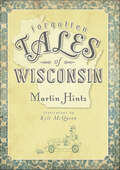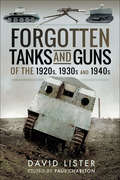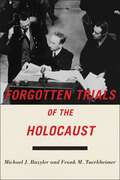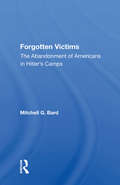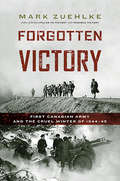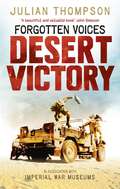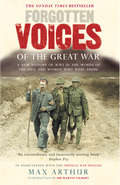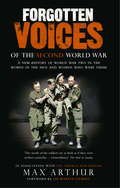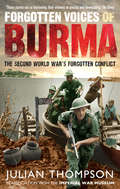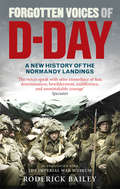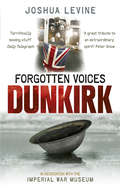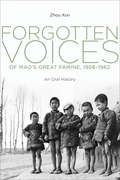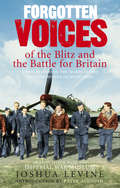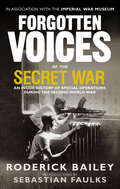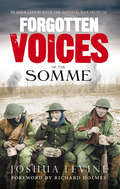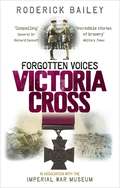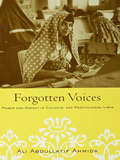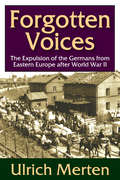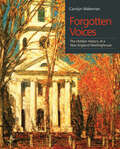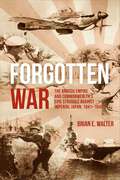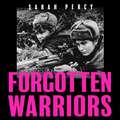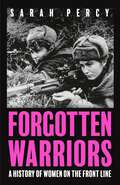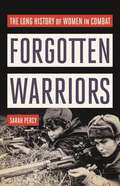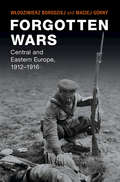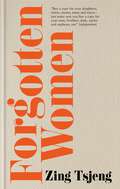- Table View
- List View
Forgotten Tales of Wisconsin (Forgotten Tales)
by Martin HintzDrift back to an era when the speed limit in Milwaukee was an edgy four miles per hour and Madison lawmakers could poke at hogs to punctuate the tedium of legislative sessions. Martin Hintz makes even the slow times of the Badger State fly by in this collection of Wisconsin's forgotten memories. Taste the world's first batch of pink lemonade (made with the dye of a circus performer's pants) and witness the tragic death of the world's last wild passenger pigeon. Track down ancient Algonkin legends like the great serpent that swam up the Mississippi looking for copper, and drop in on modern legends like Les Paul, whose guitar spun records into gold.
Forgotten Tanks and Guns of the 1920s, 1930s and 1940s
by David ListerHistory forgets. Files are lost and mislaid. But this book seeks to shine a light, offering a collection of cutting edge pieces of historical research detailing some of the most fascinating arms and armament projects from the 1920s to the end of the 1940s, nearly all of which had previously been lost to history.Included here are records from the UKs MI10 (the forerunner of GCHQ) which tell the story of the mighty Japanese heavy tanks and their service during the Second World War. Other chapters expand on the development of British armour, including the story of infantry tanks from the 1920s right through to the end of the Second World War and beyond.Other items placed beneath the microscope in this fascinating history include a wide variety of guns, rocket launchers, super heavy tanks and countless pieces of specialised armour. Previously overlooked, hidden under layers of dust in archives up and down the country, the histories of these objects has finally been uncovered.
Forgotten Trials of the Holocaust
by Michael J. Bazyler Frank M. TuerkheimerIn the wake of the Second World War, how were the Allies torespond to the enormous crime of the Holocaust? Even in an ideal world, itwould have been impossible to bring all the perpetrators to trial.Nevertheless, an attempt was made to prosecute some. This book uncovers ten “forgotten trials” of the Holocaust,selected from the many Nazi trials that have taken place over the course of thelast seven decades. It showcases how perpetrators of the Holocaust were dealtwith in courtrooms around the world, revealing how differentlegal systems responded to the horrors of the Holocaust. The book provides agraphic picture of the genocidal campaign against the Jews through eyewitnesstestimony and incriminating documents and traces how the public memory of theHolocaust was formed over time.
Forgotten Victims: The Abandonment Of Americans In Hitler's Camps
by Mitchel G BardThe outbreak of war in Europe in 1939 put tens of thousands of American civilians, especially Jews, in deadly peril, and yet the US State Department failed to help them. Consequently many suffered and some died. Later, when the United States joined the war against Hitler, many American and, in particular, Jewish American soldiers were captured and
Forgotten Victory
by Mark ZuehlkeDuring the winter of 1944-45, the western Allies desperately sought a strategy that would lead to Germany's quick defeat. After much rancorous debate, the Allied high command decided that First Canadian Army would launch the pivotal offensive to win the war-an attack against the Rhineland, an area of Germany on the west bank of the Rhine. Winning this land would give them a launching point for crossing the river and driving into Germany's heartland. This was considered the road to victory. For those who fought, the names of battlegrounds such as Moyland Wood and the Hochwald Gap would forever call up memories of uncommon heroism, endurance and tragic sacrifice. Their story is one largely lost to the common national history of World War II. Forgotten Victory gives this important legacy back to Canadians.
Forgotten Voices Desert Victory
by Julian Thompson Imperial War Museum‘Between Friday and Monday we never slept at all. Everyone’s face was one mass of sand … The guns were so hot, all the paint had gone’ Bombardier Ray EllisHad the Allies lost in North Africa, Rommel’s Afrika Korps would have swept through the Middle East, cutting the vital supply line through the Suez Canal to Australia and India, and taking the oilfields of the Persian Gulf. Britain would have been isolated, without oil, and unable to fight.These historic battles of 1940–1943 were fought over vast distances on rugged terrain, with supply lines often stretched to breaking point. It was here that David Stirling formed the SAS to perform audacious sabotage missions, and the Long Range Desert Group collected intelligence from behind enemy lines.This is the story of the Allies’ first victory against Hitler’s army, told in the voices of the men who were there, which proved that the seemingly unstoppable Germans could be beaten.
Forgotten Voices Of The Great War
by Max ArthurIn 1960, the Imperial War Museum began a momentous and important task. A team of academics, archivists and volunteers set about tracing WWI veterans and interviewing them at length in order to record the experiences of ordinary individuals in war. The IWM aural archive has become the most important archive of its kind in the world. Authors have occasionally been granted access to the vaults, but digesting the thousands of hours of footage is a monumental task. Now, forty years on, the Imperial War Museum has at last given author Max Arthur and his team of researchers unlimited access to the complete WWI tapes. These are the forgotten voices of an entire generation of survivors of the Great War. The resulting book is an important and compelling history of WWI in the words of those who experienced it.
Forgotten Voices Of The Second World War: A New History of the Second World War in the Words of the Men and Women Who Were There
by Max ArthurThe Imperial War Museum holds a vast archive of interviews with soldiers, sailors, airmen and civilians of most nationalities who saw action during WW2. As in the highly-acclaimed Forgotten Voices of the Great War, Max Arthur and his team of researchers spent hundreds of hours digging deep into this unique archive, uncovering tapes, many of which have not been listened to since they were created in the early 1970s. The result will be the first complete oral history of World War 2. We hear at first from British, German and Commonwealth soldiers and civilians. Accounts of the impact of U.S. involvement after Pearl Harbour and the major effects it had on the war in Europe and the Far East is chronicled in startling detail, including compelling interviews from U.S. and British troops who fought against the Japanese. Continuing through from D-Day, to the Rhine Crossing and the dropping of the Atom Bomb in August 1945, this book is a unique testimony to one of the world's most dreadful conflicts. One of the hallmarks of Max Arthur's work is the way he involves those left behind on the home front as well as those working in factories or essential services. Their voices will not be neglected.
Forgotten Voices of Burma: The Second World War's Forgotten Conflict
by Julian ThompsonFrom the end of 1941 to 1945 a pivotal but often overlooked conflict was being fought in the South-East Asian Theatre of World War 2 - the Burma Campaign.In 1941 the Allies fought in a disastrous retreat across Burma against the Japanese - an enemy more prepared, better organised and more powerful than anyone had imagined. Yet in 1944, following key battles at Kohima and Imphal, and daring operations behind enemy lines by the Chindits, the Commonwealth army were back, retaking lost ground one bloody battle at a time.Fighting in dense jungle and open paddy field, this brutal campaign was the longest fought by the British Commonwealth in the Second World War. But the troops taking part were a forgotten army, and the story of their remarkable feats and their courage remains largely untold to this day.The Fourteenth Army in Burma became one of the largest and most diverse armies of the Second World War. British, West African, Ghurkha and Indian regiments fought alongside one another and became comrades. In Forgotten Voices of Burma - a remarkable new oral history taken from Imperial War Museum's Sound Archive - soldiers from both sides tell their stories of this epic conflict.
Forgotten Voices of D-Day: A Powerful New History of the Normandy Landings in the Words of Those Who Were There
by Roderick Bailey6 June 1944: the day Allied forces crossed the Channel and began fighting their way into Nazi-occupied Northwest Europe. Initiated by airborne units and covered by air and naval bombardment, the Normandy landings were the most ambitious combined airborne and amphibious assault ever attempted. Their success marked the beginning of the end for Nazi Germany.Drawing on thousands of hours of eyewitness testimony recorded by the Imperial War Museum, Forgotten Voices of D-Day tells the compelling story of this turning point in World War 2. Hearing from paratroopers and commandos, glider pilots and landing craft crewmen, airmen and naval personnel, we learn first-hand what it was like as men waited to go in, as they neared the beaches and drop zones, and as they landed and met the enemy. Accounts range from memories of the daring capture of 'Pegasus' bridge by British glider-bourn troops to recollections of brutal fighting as the assault forces stormed the beaches. Featuring a mass of previously unpublished material, Forgotten Voices of D-Day is a powerful and important new record of a defining moment in modern history.
Forgotten Voices of Dunkirk
by Joshua LevineThe subject of the new major film by Christopher NolanIt could have been the biggest military disaster suffered by the British in the Second World War, but against all odds the British Army was successfully evacuated, and 'Dunkirk spirit' became synonymous with the strength of the British people in adversity.On the same day that Winston Churchill became Prime Minister, Nazi troops invaded Holland, Luxembourg and Belgium. The eight-month period of calm that had existed since the declaration of war was over. But the defences constructed by the Allies in preparation failed to repel a German army with superior tactics.The British Expeditionary Force soon found themselves in an increasingly chaotic retreat. By the end of May 1940, over 400,000 Allied troops were trapped in and around the port of Dunkirk without shelter or supplies. Hitler's army was just ten miles away. On 26 May, the British Admiralty launched Operation Dynamo. This famous rescue mission sent every available vessel - from navy destroyers and troopships to pleasure cruisers and fishing boats - over the Channel to Dunkirk. Of the 850 'Little Ships' that sailed to Dunkirk, 235 were sunk by German aircraft or mines, but over this nine day period 338,000 British and French troops were safely evacuated. Drawing on the wealth of material from the Imperial War Museum Sound Archive, Forgotten Voices of Dunkirk presents in the words of both rescued and rescuers in an intimate and dramatic account of what Winston Churchill described as a 'miracle of deliverance'.
Forgotten Voices of Mao's Great Famine, 1958-1962
by Xun ZhouIn 1958, China's revered leader Mao Zedong instituted a program designed to transform his giant nation into a Communist utopia. Called the Great Leap Forward, Mao's grand scheme--like so many other utopian dreams of the 20th century--proved a monumental disaster, resulting in the mass destruction of China's agriculture, industry, and trade while leaving large portions of the countryside forever scarred by man-made environmental disasters. The resulting three-year famine claimed the lives of more than 45 million people in China. In this remarkable oral history of modern China's greatest tragedy, survivors of the cataclysm share their memories of the devastation and loss. The range of voices is wide: city dwellers and peasants, scholars and factory workers, parents who lost children and children who were orphaned in the catastrophe all speak out. Powerful and deeply moving, this unique remembrance of an unnecessary and unhindered catastrophe illuminates a dark recent history that remains officially unacknowledged to this day by the Chinese government and opens a window on a society still feeling the impact of the terrible Great Famine.
Forgotten Voices of the Blitz and the Battle For Britain: A New History in the Words of the Men and Women on Both Sides
by Joshua LevineDrawing material from the Imperial War Museum's extensive aural archive, Joshua Levine brings together voices from both sides of the Blitz and the Battle of Britain to give us a unique, complete and compelling picture of this turbulent time.In June 1940, British citizens prepared for an imminent German onslaught. Hitler's troops had overrun Holland, Belgium and France in quick succession, and the British people anticipated an invasion would soon be upon them. From July to October, they watched the Battle of Britain play out in the skies above them, aware that the result would decide their fate. Over the next nine months, the Blitz killed more than 43,000 civilians. For a year, the citizens of Britain were effectively front-line soldiers in a battle which united the country against a hated enemy.We hear from the soldiers, airmen, fire-fighters, air-raid wardens and civilians, people in the air and on the ground, on both sides of the battle, giving us a thrilling account of Britain under siege. With first-hand testimonies from those involved in Dunkirk and the Battle of Britain, Black Saturday on 7th September 1940 when the Luftwaffe began the Blitz, to its climax on the 10th May 1941, this is the definitive oral history of a period when Britain came closer to being overwhelmed by the enemy than at any other time in modern history.
Forgotten Voices of the Secret War: An Inside History of Special Operations in the Second World War
by Roderick Bailey'The Gestapo kept me three days in this interrogation house. They especially wanted to know what I did after my escape, and precise things on the organisation of the SOE. And just for fun I suspect, because I had really not much to tell them, they pulled one of my toenails out...' - Robert Sheppard, SOE agentThe Special Operations Executive (SOE) was a secret British organisation created early in World War 2 to encourage resistance and carry out sabotage behind enemy lines: in Winston Churchill's famous phrase, to 'set Europe ablaze'. Drawing on the vast resources of the Imperial War Museum Sound Archive and featuring a mass of previously unpublished personal testimonies, Forgotten Voices of the Secret War tells the stories of SOE agents, HQ staff, diplomats, aircrew and naval personnel in their own words. As the war unfolds, we learn of parachute drops into enemy territory, torture by the Gestapo and nerve-wracking sabotage missions in far-flung climes.Forgotten Voices of the Secret War is both an incredible account of espionage during World War 2 and a fitting testament to the efforts and sacrifices of a dedicated group of courageous men and women.
Forgotten Voices of the Somme: The Most Devastating Battle of the Great War in the Words of Those Who Survived
by Joshua Levine1916. The Somme. With over a million casualties, it was the most brutal battle of World War I.It is a clash that even now, over 90 years later, remains seared into the national consciousness, conjuring up images of muddy trenches and young lives tragically wasted. Its first day, July 1st 1916 - on which the British suffered 57,470 casualties, including 19,240 dead - is the bloodiest day in the history of the British armed forces to date. On the German side, an officer famously described it as 'the muddy grave of the German field army'. By the end of the battle, the British had learned many lessons in modern warfare while the Germans had suffered irreplaceable losses, ultimately laying the foundations for the Allies' final victory on the Western Front.Drawing on a wealth of material from the vast Imperial War Museum Sound Archive, Forgotten Voices of the Somme presents an intimate, poignant, sometimes even bleakly funny insight into life on the front line: from the day-to-day struggle of extraordinary circumstances to the white heat of battle and the constant threat of injury or death. Featuring contributions from soldiers of both sides and of differing backgrounds, ranks and roles, many of them previously unpublished, this is the definitive oral history of this unique and terrible conflict.
Forgotten Voices of the Victoria Cross
by The Imperial War Museum Roderick Bailey'It wasn't until after he was safely back in the aircraft again that I heard that he'd actually been out on the wing to try to put the fire out ... Remember that we were flying at about 90 miles an hour at a height of 13,000 feet'Squadron Leader RP Widdowson on Sergeant James Ward, who earned his VC in 1941 The Victoria Cross, awarded to the most courageous and determined servicemen, is the highest military decoration that can be bestowed.In Forgotten Voices: Victoria Cross, first-hand accounts of soldiers, sailors and airmen describe the incredible events that earned these extraordinary men the VC in the last century.Captivating and often humbling, these stories depict exceptional acts of bravery in unimaginable situations, of men who would say they were just doing their duty.Introduction by General Sir Richard Dannatt.
Forgotten Voices: Power and Agency in Colonial and Postcolonial Libya
by Ali Abdullatif AhmidaIn Forgotten Voices, Ali Abdullatif Ahmida employs archival research, oral interviews and comparative analysis to rethink the history of colonial and nationalist categories and analyses of modern Libya.
Forgotten Voices: The Expulsion of the Germans from Eastern Europe After World War II
by Ulrich MertenThe news agency Reuters reported in 2009 that a mass grave containing 1,800 bodies was found in Malbork, Poland. Polish authorities suspected that they were German civilians that were killed by advancing Soviet forces. A Polish archeologist supervising the exhumation, said, "We are dealing with a mass grave of civilians, probably of German origin. The presence of children . . . suggests they were civilians."During World War II, the German Nazi regime committed great crimes against innocent civilian victims: Jews, Poles, Russians, Serbs, and other people of Central and Eastern Europe. At war's end, however, innocent German civilians in turn became victims of crimes against humanity. Forgotten Voices lets these victims of ethnic cleansing tell their story in their own words, so that they and what they endured are not forgotten. This volume is an important supplement to the voices of victims of totalitarianism and has been written in order to keep the historical record clear.The root cause of this tragedy was ultimately the Nazi German regime. As a leading German historian, Hans-Ulrich Wehler has noted, "Germany should avoid creating a cult of victimization, and thus forgetting Auschwitz and the mass killing of Russians." Ulrich Merten argues that applying collective punishment to an entire people is a crime against humanity. He concludes that this should also be recognized as a European catastrophe, not only a German one, because of its magnitude and the broad violation of human rights that occurred on European soil.Supplementary maps and pictures are available online at http://www.forgottenvoices.net
Forgotten Voices: The Hidden History of a New England Meetinghouse (The Driftless Series)
by Carolyn WakemanThe history inscribed in New England's meetinghouses waits to be told. There, colonists gathered for required worship on the Sabbath, for town meetings, and for court hearings. There, ministers and local officials, many of them slave owners, spoke about salvation, liberty, and justice. There, women before the Civil War found a role and a purpose outside their households. This innovative exploration of a coastal Connecticut town, birthplace of two governors and a Supreme Court Chief Justice, retrieves the voices preserved in record books and sermons and the intimate views conveyed in women's letters. Told through the words of those whose lives the meetinghouse shaped, Forgotten Voices uncovers a hidden past. It begins with the displacement of Indigenous people in the area before Europeans arrived, continues with disputes over worship and witchcraft in the early colonial settlement, and looks ahead to the use of Connecticut's most iconic white church as a refuge and sanctuary. Relying on the resources of local archives, the contents of family attics, and the extensive records of the Congregational Church, this community portrait details the long ignored genocide and enslaved people and reshapes prevailing ideas about history's makers. Meticulously researched and including 75 color illustrations, Forgotten Voices will be of interest to anyone exploring the roots of community life in New England.The book is the joint project of the Old Lyme meetinghouse and the Florence Griswold Museum. The museum will host a major exhibit in 20192020, exploring the role of the meetinghouse.
Forgotten War: The British Empire and Commonwealth’s Epic Struggle Against Imperial Japan, 1941–1945
by Brian E. WalterA new assessment of the British and Commonwealth contribution to the defeat of Japan in the Pacific. The monumental struggle fought against Imperial Japan in the Asia/Pacific theater during World War II is primarily viewed as an American affair. While the United States did play a dominant role, the British and Commonwealth forces also made major contributions—on land, at sea and in the air, eventually involving over a million men and vast armadas of ships and aircraft. It was a difficult and often desperate conflict fought against a skilled and ruthless enemy that initially saw the British suffer the worst series of defeats ever to befall their armed forces. Still, the British persevered and slowly turned the tables on their Japanese antagonists. Fighting over an immense area that stretched from India in the west to the Solomon Islands in the east and Australia in the south to the waters off Japan in the north, British and Commonwealth forces eventually scored a string of stirring victories that avenged their earlier defeats and helped facilitate the demise of the Japanese Empire. Often overlooked by history, this substantial war effort is fully explored in Forgotten War. Meticulously researched, the book provides a complete, balanced and detailed account of the role that British and Commonwealth forces played on land, sea and in the air during this crucial struggle. It also provides unique analysis regarding the effectiveness and relevance of this collective effort and the contributions it made to the overall Allied victory.
Forgotten Warriors: A History of Women on the Front Line
by Sarah PercyFrom the Amazons to the Ukraine conflict, women have always been on the frontline of war: this is their surprising and heroic history.Battlefields have always contained a surprising number of women. Tracing the long history of female fighters, Forgotten Warriors puts the record straight, exploring how war became an all-male space, and getting to the bottom of why women were allowed to be astronauts a full thirty years before they were allowed to fight in combat.From the Mino, the all-female army that protected Dahomey from the West for two hundred years to the Night Witches, Soviet flying aces that decimated the Nazis; from the real story of Joan of Arc to the cross-dressing soldiers whose disguises were so effective the men around them never realized who they were fighting with, Sarah Percy shines a fascinating new light on the history of warfare. And against a backdrop of sieges and desperate battles, rebellions and civil wars, a series of extraordinary women come alive on the page, determined not to be passive victims.Every country has their tomb to the unknown warrior, picking out one unnamed body to represent the sacrifices of thousands of others. As Forgotten Warriors shows, those overlooked soldiers could well be female. Their heroic and compelling stories need to be heard.(P) 2023 Hodder & Stoughton Limited
Forgotten Warriors: A History of Women on the Front Line
by Sarah PercyFrom Boudicca to Ukraine, battlefields have always contained a surprising number of women. Tracing the long history of female fighters, Forgotten Warriors puts the record straight, exploring how war became an all-male space, and getting to the bottom of why women were allowed to be astronauts a full thirty years before they were allowed to fight in combat.From the Mino, the all-female army that protected Dahomey from the West for two hundred years to the Night Witches, Soviet flying aces that decimated the Nazis; from the real story of Joan of Arc to the cross-dressing soldiers whose disguises were so effective the men around them never realized who they were fighting with, Sarah Percy shines a fascinating new light on the history of warfare. And against a backdrop of sieges and desperate battles, rebellions and civil wars, a series of extraordinary women come alive on the page, determined not to be passive victims.Every country has their tomb to the unknown warrior, picking out one unnamed body to represent the sacrifices of thousands of others. As Forgotten Warriors shows, those overlooked soldiers could well be female. Their heroic and compelling stories need to be heard.
Forgotten Warriors: The Long History of Women in Combat
by Sarah PercyThe definitive history of women in war, revealing how women have always been an essential part of combat From Boudicca&’s rebellion to the war in Ukraine, battlefields have always contained a surprising number of women. Some formed all-female armies, like the Dahomey Mino of West Africa; some fought disguised as men; some mobilized in times of national survival, like the Soviet flying aces known as the Night Witches. International relations expert Sarah Percy unearths the stories of these forgotten warriors. She sets the historical record straight, revealing that women&’s exclusion from active combat in the late nineteenth and early twentieth centuries is a blip in a much longer narrative of female inclusion. Deeply researched and brilliantly told, Forgotten Warriors turns the notion of war as a man&’s game on its head and restores women to their rightful place on the front lines of history.
Forgotten Wars: Central and Eastern Europe, 1912–1916 (Studies in the Social and Cultural History of Modern Warfare)
by Włodzimierz Borodziej Maciej GórnyWłodzimierz Borodziej and Maciej Górny set out to salvage the historical memory of the experience of war in the lands between Riga and Skopje, beginning with the two Balkan conflicts of 1912–1913 and ending with the death of Emperor Franz Joseph in 1916. The First World War in the East and South-East of Europe was fought by people from a multitude of different nationalities, most of them dressed in the uniforms of three imperial armies: Russian, German, and Austro-Hungarian. In this first volume of Forgotten Wars, the authors chart the origins and outbreak of the First World War, the early battles, and the war's impact on ordinary soldiers and civilians through to the end of the Romanian campaign in December 1916, by which point the Central Powers controlled all of the Balkans except for the Peloponnese. Combining military and social history, the authors make extensive use of eyewitness accounts to describe the traumatic experience that established a region stretching between the Baltic, Adriatic, and Black Seas.
Forgotten Women
by Zing Tsjeng'To say this [book] is "empowering" doesn't do it justice. Buy a copy for your daughters, sisters, mums, aunts and nieces - just make sure you buy a copy for your sons, brothers, dads, uncles and nephews, too.' - indy100'Here's to no more forgotten women.' - Evening StandardForgotten Women reaches around the world and its history to rediscover, retell and reinstate the lives of over 190 important and significant women. From Neolithic times to modernity, Zing Tsjeng has traced the women who have shaped their age and revolutionised society. In this book lies the strength, lives and sacrifices of women who have refused to accept the hand they've been dealt and have changed the course of our futures accordingly.
